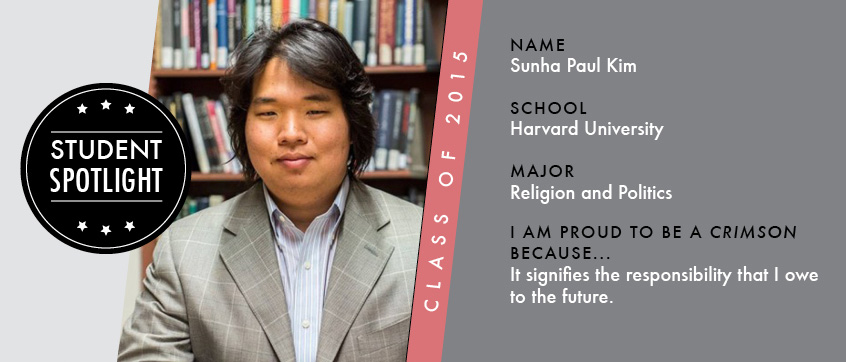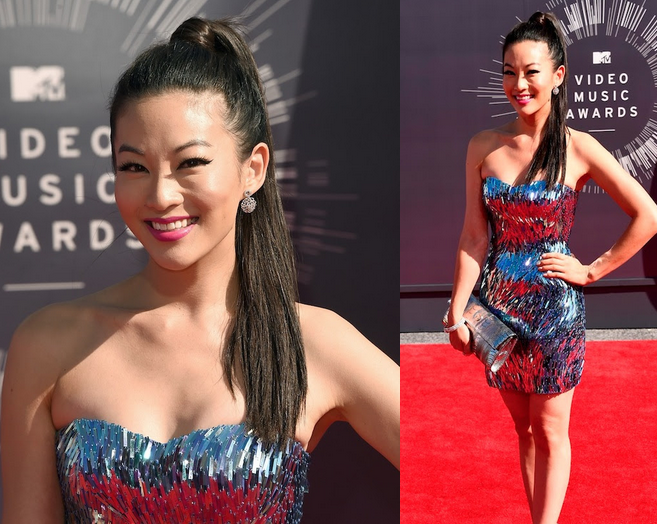Give a little description of your background (where did you grow up, etc.).
I was born and raised in the South Bay area of L.A., but I have also lived in Ohio and New England. I am grateful to have lived in all three places because I have gained greater insight with regards to my cultural identity. It really wasn’t until I moved to Ohio that I realized I was, as a Korean American, different from the majority of this country. Even though I spent most of my life in California, I like to say that I really grew up in Ohio, because I definitely experienced a profound cultural awakening which enabled me to gain a truer sense of what it means to be an American in Ohio.
Are there any organizations/clubs you are involved in? Tell us about what you’re up to!
I helped establish a Harvard based religious grassroots movement and Super PAC called Stand For Democracy that is currently aiming to repeal gambling laws in Massachusetts. Repealing gambling laws is important for me because gambling is such a large problem for Korean Americans and Asian Americans in general. It is also something that has directly affected my family and I am sure that my family is not the only one. Also, a win in November’s election would mark the first time in American history that a state has ever overturned gambling laws. Repealing gambling laws in Massachusetts would be a watershed moment in American history.
Our organization has been responsible for getting the Muslims, Mormons, Protestants, Catholics, and Jews to work together all throughout Massachusetts in order to overturn this state’s gambling laws. We have also assembled a team of world class advisors from Harvard’s faculty (including the professor who created President Obama’s successful grassroots campaign in 2008) who are helping us grow this movement. Currently, we are working on raising close to $2 Million from all over the country to take on the casino industry this November. You can check out our website at StandForDemocracy.com and even donate a few dollars to support our cause.
What was the hardest thing you’ve done so far?
Helping to start a grassroots movement to fight a $50,000,000 political machine funded by multiple casino corporations is by far the hardest thing I have done and am currently working on. It’s a David vs. Goliath struggle, but with the right tools, David sometimes wins.
What’s the best thing about your school?
Having incredible role models. There aren’t too many schools where one can have dinner with the former President of Mexico, work with gubernatorial candidates, and take classes with million book selling authors and one of the European Union’s top economic advisors. Of course, this is a double-edged sword because it this is how some people lose touch with reality.
What song is representative of your life right now?
“Get Up Stand Up” by Bob Marley.
I think Bob Marley is too often written off for having merely written stoner hymns. While there is nothing wrong with this perception, people too often miss the powerful and profound message of Marley’s work.
Your go-to food place:
When in LA: Kogi. I am a huge fan of chef Roy Choi because he simply makes a damn good taco. I also believe that Chef Roy has created a new type of food: Korean American Food. My advisor at Harvard, Professor David Carrasco, teaches about the cultural exchanges that particularly take place in large cities. Whether Chef Roy knows it or not, Kogi’s food signifies a Korean-Mexican cultural exchange that has given rise to a new Korean-American-Mexican culture that could only have originated in Los Angeles. I write a lot about Roy Choi’s work in my classes and I know he’d be welcome anytime to speak at Harvard.
When in Boston: Bon Me. I love food trucks. There is a food truck that parks in front of Harvard Yard almost every day and sells Miso Braised Pulled Pork foot long sandwiches for $6. Bon Me takes cultural exchange to another level. Think about it. Vietnamese sandwiches (Bon Me) were first created in Vietnam during French colonial times. So here we at least have Vietnamese, French, Japanese (Miso), and American (good old pulled pork) culinary influences coming into play with one sandwich. It’s pure magic.
Is there anywhere in the world where you’d want to study abroad? Where is it, and why?
Supporting Manchester City Football Club has given me a window into the socio-political dynamics of everyday life in Manchester, England. City fans are generally hard working blue collar people who have historically supported an awful soccer team for many fascinating reasons. Most of Manchester supports City even though Manchester United is obviously the bigger global club. Imagine if Los Angeles, in the midst of the Shaq-Kobe dynasty, was mostly Clipper fans. I admire City fans for their loyalty to Manchester City and it would be incredible to have a chance to live and study in Manchester and to learn more about the incredibly interesting people there. It would also go a long way towards getting people to stop calling me a glory hunting wanker.
What does your typical night out consist of?
I don’t get many of these, so it’s important to take the most out of a night out. A typical night out is all about going out to Boston, going to the clubs, and taking trip to rage city. I never drink cheap alcohol and you shouldn’t either. It might certainly mean drinking less often but that’s the smart thing to do anyways.
What was the last book you read…for fun?
The Martyred by Richard E. Kim.
My grandfather died earlier this year and I never spoke to him about how he fought in the Korean War or how he moved his family across an ocean to re-start life. Richard E. Kim and my grandfather are similar in very specific ways. Kim was born in 1932 and my grandfather was born in 1931, which means they were 21 and 22 when the Korean War broke out. This means that out of all the Korean soldiers that fought in the Korean War, Kim and my grandfather were only one of a relative few that actually dropped out of university and sacrificed their education to fight in a war. Of course, afterwards both Kim and my grandfather came to America. I viewed Kim’s book as perhaps the only window I had to look into what Korean Americans of my grandfather’s generation were thinking about the Korean War. That’s why this book was, for me, a wonderful read.
What has been your favorite memory so far?
Organizing and witnessing Muslims, Jews, and Christians pray together in public for greater good has been my most moving and favorite memory so far.
If you would like to participate in KoreAm U’s Student Spotlight feature, you can find more information here. Alumni, we have something for you too!











